

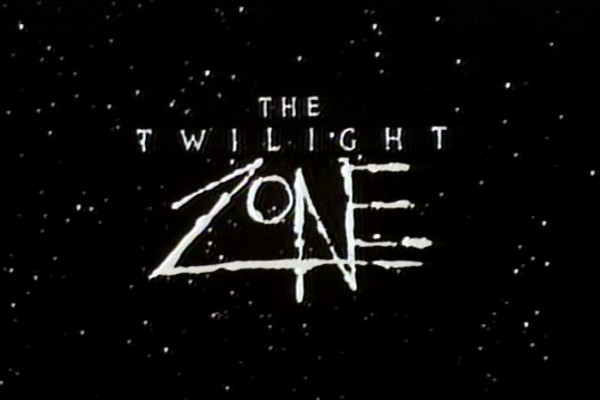
The DVD with all 11 episodes is available via Amazon. In the meantime, please join me as I rank the second season from worst to best...
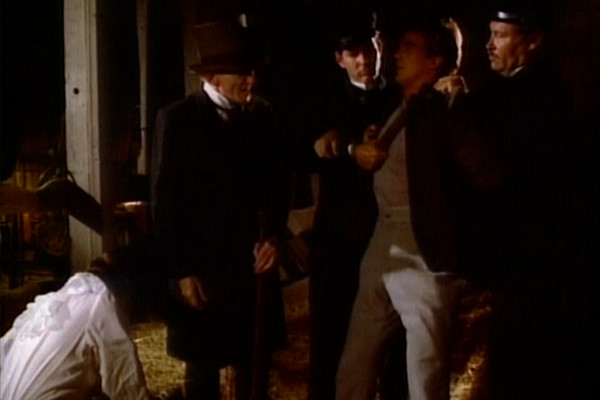
The second season's worst story sees two young lovers in the 1910s torn apart by the girl's domineering father. In order to escape and consummate their love, they use the I-Ching so that they can both leave their bodies and their astral spirits can occupy wolves. Let's be honest... haven't we seen this plot done way too many times before?
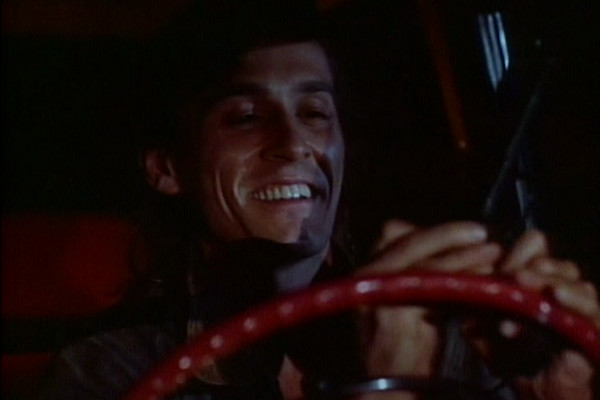
Thanks to all the feather cut hair styles and electronic party sounds by Merl Saunders, there's perhaps never been a more "80s" episode of The Twilight Zone than this one. A corny, badly-staged tale about four teens stealing a possessed car, it's a kind of Christine meets Weekend At Bernie's, only nowhere near as much fun as that sounds. Writer Cal Willingham returned for season three's Love Is Blind, his only other writing credit on television.
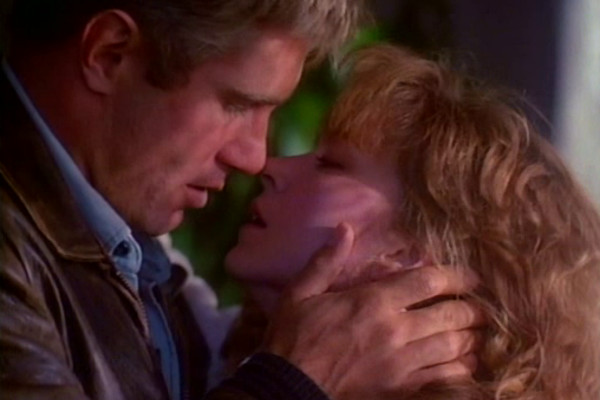
When I originally wrote an overview of season two for the site's Twilight Zone microsite, I savaged this episode. On reflection, while it's heavily flawed, it perhaps has some merits which I hadn't given credit. Lisa Eilbacher is an intuitive actress who famously ad-libbed an impression of Eddie Murphy's trademark laugh in Beverly Hills Cop, causing the star to break into laughter as a result. Her performance here is actually incredibly engaged, directed by her real-life boyfriend (now husband), Bradford May.
Sadly, most of the derision the story attracts is on the shoulders of co-star Antony Hamilton, who manages an exceptionally wooden performance while delivering admittedly poorly-written lines. That the "twist" is that he died - something clearly signposted right from his first appearance - is a further downward step in a story that never manages to come together.
The incidental music for the second season became much more generic, so that while a lot of it didn't detract from the episodes the way that much of season one's did, it was also less memorable. With the Grateful Dead not supplying any of the music for the season, most of it was composed by Merl Saunders (seven episodes) or the composer of season one's Button, Button, Robert Folk (four episodes). The music here is scored by John Debney with Michael Wetherwax, with original songs written and performed by Stephen Stills.
The DVD release of the second season doesn't contain as many commentaries as the first. While there's obviously less stories, just five of the 21 stories present receive a commentary track, including The Card and The Once and Future King. In Nightsong's case executive producer Philip DeGuere talks with director Bradford May. May comes off, not unexpectedly, as defensive of the story, and doesn't brook any attempt at criticism of what is a very substandard instalment of the series.
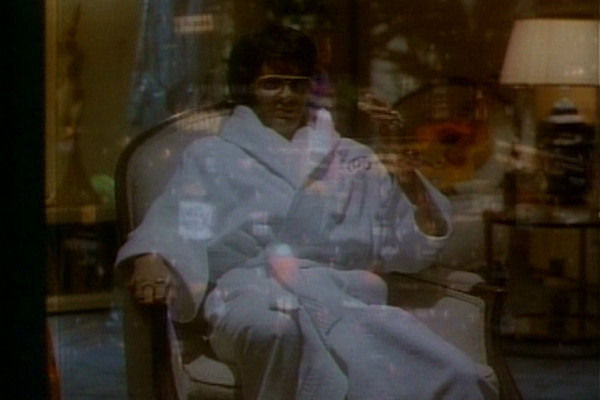
An exceptionally bad-taste season opener whereby Gary Pitkin, a lookalike Elvis impersonator, travels back in time to meet the real Elvis and convinces him that he's his stillborn twin brother come back to life. After a dispute between them breaks out, the real Elvis goes on a rampage, before accidentally skewering himself on a broken guitar neck. The impersonator - an Elvis purist so blinkered he even believes rock and roll wouldn't have existed without him - takes over Elvis's life for him, though still does Vegas and the terrible movies as he feels it's what Elvis would have wanted.
Jeff Yagher does his best in a dual role, but for such a universally recognisable person as Elvis, it's important that the actor bares more than a vague passing resemblance. In fact, it's arguable that he really looks nothing at all like him, and the viewer has to heavily "buy in" to the conceit for it to work. Combine this with later details like Elvis's mother being said to have died because she knew deep down her son was dead, and that Gary realises he'll also have to die in 1977 to preserve the timeline and it's a really inappropriate screenplay. That this was considered worthy of launching a new season and was released with the cooperation of the Presley Estate is astonishing.
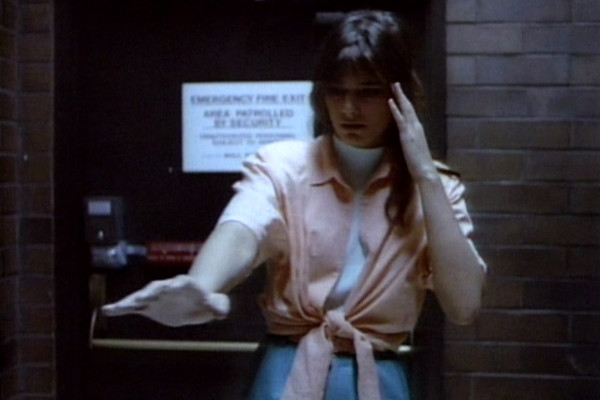
Written by Rockne S. O'Bannon and based on the 1960 script by Rod Serling, this is the only remake of season two. Although not a terrible episode, it highlights a lack of narrative efficiency, with a cluttered, unfocussed storyline. It also brings to the forefront things that were kept as a twist in the original: it's less than halfway into the episode when Marsha (Terry O'Farrell) is confronted with questions about her origins. Consequently the episode is never about the mysterious goings on at a store, but always about the mystery surrounding the lead character, somewhat missing the point.
The story turning into a runaround with 80s B-movie action thriller music and a flat ending take down the quality further, but what really harms the story is the way it tries to take a fundamentally ridiculous situation and play it as straight terror, thus highlighting the shortcomings rather than making a virtue out of them. However, those who enjoy hearing the word "Marsha" shouted repeatedly may enjoy the 131 instances of this name in the story. Yes, I counted... why do think this site is called "The Anorak Zone"?
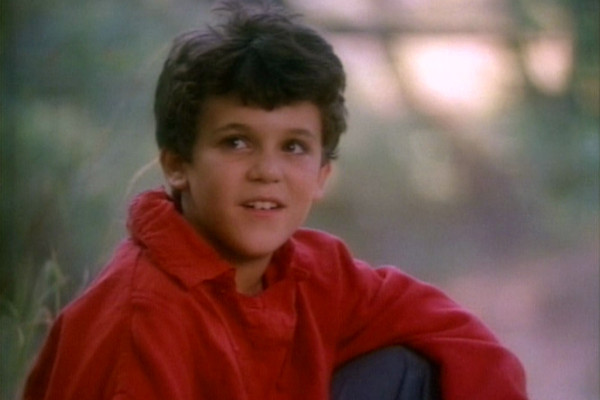
Probably most significant as J. Michael Straczynski's first involvement with the series, writing the episode freelance. When CBS scrapped the original production crew and relaunched the series in 1988, he was given the role of executive story editor and wrote a third of the third season episodes, along with providing the story for another. He remains most famous for creating the 1993 series Babylon 5.
Also notable is Fred Savage, star of The Wonder Years, though, as with
Bruce Willis and Morgan Freeman in the first season, this was before his breakout role and he was a relative unknown. Sadly, it's perhaps not a great debut for either, as a father's imaginary friend comes to life to play with his son, in "twist" revelations that are almost as clearly signposted as those in Night Song. Lukas Haas plays the imaginary friend, and would reappear in the 2002 revival series episode Harsh Mistress.
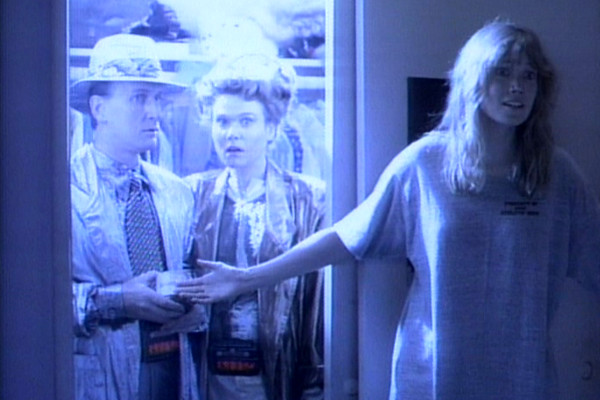
Season two is far more uniform and less experimental than the first, even down to the story lengths. Whereas season one varied widely, all but three of the season two stories had an 18-25 minute length. Those three shorter stories are Private Channel (12 minutes), Joy Ride (11 minutes) and, here, a 5 minute light-hearted tale by George R. R. Martin. Featuring time travellers coming back to visit a college girl who will one day be Earth President, it's kind of cute, but ultimately forgettable. Based on a short story by Phyllis Eisenstein, the segment was reputedly around 8 minutes in length for original broadcast and trimmed for its DVD release.